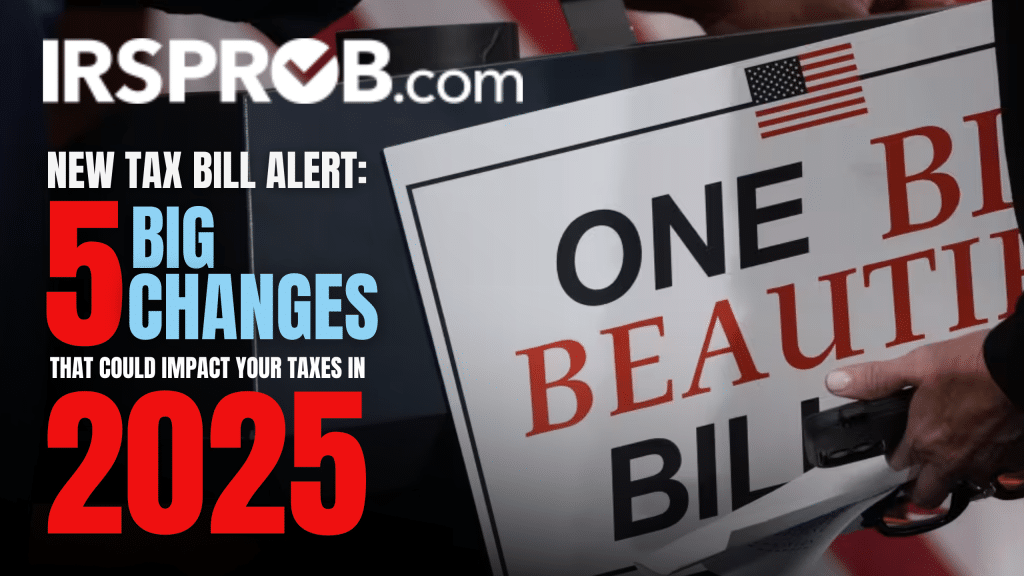New Tax Bill Alert: 5 Big Changes That Could Impact Your Taxes in 2025

Congress is in motion again—and this time, it’s personal. On May 22, the House of Representatives passed the sweeping “One Big Beautiful Bill,” aimed at reshaping large parts of the tax code. While it still faces tough scrutiny in the Senate, Americans need to pay close attention. Whether you’re a retiree, working professional, or small business owner, this bill has implications that could directly impact your wallet starting in 2025.
Here are the 5 most important takeaways from the proposed legislation:
Although the House passed the bill with a razor-thin margin (215-214), it’s a far cry from becoming law. The Senate has its own priorities—and plenty of disagreement.
Some GOP senators oppose the deep Medicaid cuts included in the bill, while others want to make business tax breaks permanent. There’s also strong resistance to the repeal of clean-energy credits, which several industries and states rely on heavily. Add to that the estimated $2.8 trillion increase to the federal deficit over the next 10 years, and it’s easy to see why the Senate may rewrite large portions before anything reaches the President’s desk.
What to Watch: Republican leaders aim to send a final bill to President Trump by July 4, but insiders say late July is more likely—if it passes at all.

Social Security Benefits Still Taxed—But Seniors Could See a New Deduction
Many retirees hoped that the bill would eliminate federal taxes on Social Security benefits, especially after President Trump vowed to end them. Unfortunately, the legislative process Republicans are using—budget reconciliation—does not allow for changes to Social Security taxation.
But there’s a silver lining. The bill includes a $4,000 bonus standard deduction for taxpayers age 65 and older, which would apply starting in tax year 2025. That’s on top of the existing standard deduction, giving seniors meaningful relief—even if Social Security remains taxed.
- Married couples (both 65+) would receive $8,000 extra.
- The deduction applies to both standard and itemized filers.
- Income phaseouts apply: the deduction begins phasing out at $150,000 (joint) and $75,000 (single/HOH) modified AGI.
Important: This deduction is not tied to Social Security, so you may qualify even if your retirement income comes from other sources (like pensions or investments).

Investors were on high alert when rumors swirled that the House bill might remove the federal tax exemption on municipal bond interest (Munis). This exemption has long been a cornerstone for conservative investment and local infrastructure funding.
However, the final House version retains the tax-free status of Muni interest at the federal level. This decision followed strong lobbying from local governments and financial institutions who argued that eliminating the exemption would increase borrowing costs and stall public projects.
Good News: If you’re invested in state or local bonds, your interest income remains safe from federal income taxes—at least for now.
One major clarification: You do not need to be receiving Social Security benefits to qualify for the new bonus deduction. This is significant for retirees who rely on federal pensions, such as former government employees under the Civil Service Retirement System (CSRS), or those who opted out of Social Security entirely.
If you and/or your spouse are age 65+ and meet the income requirements, you can claim the deduction, regardless of how you receive your retirement income.
Who Benefits:
- Retired educators
- Federal and state employees on pension plans
- Self-employed individuals not enrolled in Social Security
Perhaps the most controversial aspect of the bill is its estimated cost: $2.8 trillion added to the federal deficit over the next decade. While many of the proposed tax breaks are popular, lawmakers are split on how (or whether) to offset the costs.
Proposed cuts to Medicaid, clean-energy incentives, and corporate loophole closures are all on the table—but none are politically easy. This issue alone could delay or derail the bill entirely.
Bottom Line: While the bill offers potential tax relief for individuals and businesses, expect delays and compromises in the Senate—especially with the national debt in the spotlight.
Final Thought from IRSProb.com: Stay Proactive
Big tax changes are coming—but they’re not here yet. If you’re unsure how this could affect your returns, retirement plan, or IRS standing, it’s time to get professional guidance. The team at IRSProb.com is here to help you prepare, plan, and protect your financial future.








